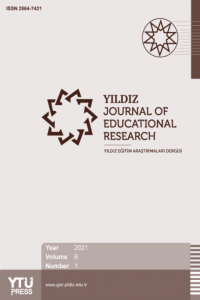Sınıf Öğretmenlerinin Öğrenilmiş Güçlülükleri Ve Yaşam Boyu Öğrenme Eğilimleri
Öz
Primary-school teachers need to be constantly in high energy and attention in their working environments due to their high responsibilities and the age of the group they work for. This requires primary-school teachers to take a strong attitude and control negativity when faced with stress. The aim of this study is to examine the learned resourcefulness levels of primary-school teachers in terms of gender, age, marital status, having children, the number of in-service trainings, management experiences, management plans and managerial qualifications and lifelong learning trends. In this context, the primary-school teachers working in the state primary schools in Bornova and Çiğli districts of İzmir formed the universe of the study. A total of 398 classroom teachers (285 female and 113 male) were included in the study. Rosenbaum Learned Resourcefulness Scale, Lifelong Learning Tendencies Scale and Personal Information Form were used to collect the data of the study. As a result of the analysis of the data, there was no significant difference between learned resourcefulness and the variables discussed; it is concluded that there is a significant and low level relationship between learned resourcefulness and lifelong learning trends.
Anahtar Kelimeler
Learned resourcefulness lifelong learning trends Primary-school teachers.
Kaynakça
- The article references can be accessed from the .pdf file.
Ayrıntılar
| Birincil Dil | İngilizce |
|---|---|
| Konular | Psikolojide Davranış-Kişilik Değerlendirmesi |
| Bölüm | Araştırma Makaleleri |
| Yazarlar | |
| Yayımlanma Tarihi | 20 Haziran 2019 |
| Yayımlandığı Sayı | Yıl 2019 Cilt: 4 Sayı: 1 |

